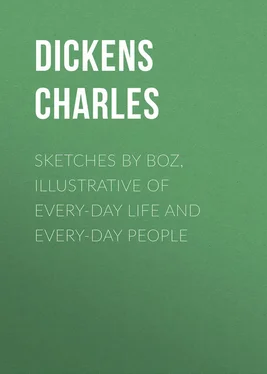Чарльз Диккенс - Sketches by Boz, Illustrative of Every-Day Life and Every-Day People
Здесь есть возможность читать онлайн «Чарльз Диккенс - Sketches by Boz, Illustrative of Every-Day Life and Every-Day People» — ознакомительный отрывок электронной книги совершенно бесплатно, а после прочтения отрывка купить полную версию. В некоторых случаях можно слушать аудио, скачать через торрент в формате fb2 и присутствует краткое содержание. Жанр: foreign_antique, foreign_prose, на английском языке. Описание произведения, (предисловие) а так же отзывы посетителей доступны на портале библиотеки ЛибКат.
- Название:Sketches by Boz, Illustrative of Every-Day Life and Every-Day People
- Автор:
- Жанр:
- Год:неизвестен
- ISBN:нет данных
- Рейтинг книги:3 / 5. Голосов: 1
-
Избранное:Добавить в избранное
- Отзывы:
-
Ваша оценка:
- 60
- 1
- 2
- 3
- 4
- 5
Sketches by Boz, Illustrative of Every-Day Life and Every-Day People: краткое содержание, описание и аннотация
Предлагаем к чтению аннотацию, описание, краткое содержание или предисловие (зависит от того, что написал сам автор книги «Sketches by Boz, Illustrative of Every-Day Life and Every-Day People»). Если вы не нашли необходимую информацию о книге — напишите в комментариях, мы постараемся отыскать её.
Sketches by Boz, Illustrative of Every-Day Life and Every-Day People — читать онлайн ознакомительный отрывок
Ниже представлен текст книги, разбитый по страницам. Система сохранения места последней прочитанной страницы, позволяет с удобством читать онлайн бесплатно книгу «Sketches by Boz, Illustrative of Every-Day Life and Every-Day People», без необходимости каждый раз заново искать на чём Вы остановились. Поставьте закладку, и сможете в любой момент перейти на страницу, на которой закончили чтение.
Интервал:
Закладка:
Charles Dickens
Sketches by Boz, Illustrative of Every-Day Life and Every-Day People
PREFACE
The whole of these Sketches were written and published, one by one, when I was a very young man. They were collected and republished while I was still a very young man; and sent into the world with all their imperfections (a good many) on their heads.
They comprise my first attempts at authorship – with the exception of certain tragedies achieved at the mature age of eight or ten, and represented with great applause to overflowing nurseries. I am conscious of their often being extremely crude and ill-considered, and bearing obvious marks of haste and inexperience; particularly in that section of the present volume which is comprised under the general head of Tales.
But as this collection is not originated now, and was very leniently and favourably received when it was first made, I have not felt it right either to remodel or expunge, beyond a few words and phrases here and there.
OUR PARISH
CHAPTER I – THE BEADLE. THE PARISH ENGINE. THE SCHOOLMASTER
How much is conveyed in those two short words – ‘The Parish!’ And with how many tales of distress and misery, of broken fortune and ruined hopes, too often of unrelieved wretchedness and successful knavery, are they associated! A poor man, with small earnings, and a large family, just manages to live on from hand to mouth, and to procure food from day to day; he has barely sufficient to satisfy the present cravings of nature, and can take no heed of the future. His taxes are in arrear, quarter-day passes by, another quarter-day arrives: he can procure no more quarter for himself, and is summoned by – the parish. His goods are distrained, his children are crying with cold and hunger, and the very bed on which his sick wife is lying, is dragged from beneath her. What can he do? To whom is he to apply for relief? To private charity? To benevolent individuals? Certainly not – there is his parish. There are the parish vestry, the parish infirmary, the parish surgeon, the parish officers, the parish beadle. Excellent institutions, and gentle, kind-hearted men. The woman dies – she is buried by the parish. The children have no protector – they are taken care of by the parish. The man first neglects, and afterwards cannot obtain, work – he is relieved by the parish; and when distress and drunkenness have done their work upon him, he is maintained, a harmless babbling idiot, in the parish asylum.
The parish beadle is one of the most, perhaps the most, important member of the local administration. He is not so well off as the churchwardens, certainly, nor is he so learned as the vestry-clerk, nor does he order things quite so much his own way as either of them. But his power is very great, notwithstanding; and the dignity of his office is never impaired by the absence of efforts on his part to maintain it. The beadle of our parish is a splendid fellow. It is quite delightful to hear him, as he explains the state of the existing poor laws to the deaf old women in the board-room passage on business nights; and to hear what he said to the senior churchwarden, and what the senior churchwarden said to him; and what ‘we’ (the beadle and the other gentlemen) came to the determination of doing. A miserable-looking woman is called into the boardroom, and represents a case of extreme destitution, affecting herself – a widow, with six small children. ‘Where do you live?’ inquires one of the overseers. ‘I rents a two-pair back, gentlemen, at Mrs. Brown’s, Number 3, Little King William’s-alley, which has lived there this fifteen year, and knows me to be very hard-working and industrious, and when my poor husband was alive, gentlemen, as died in the hospital’ – ‘Well, well,’ interrupts the overseer, taking a note of the address, ‘I’ll send Simmons, the beadle, to-morrow morning, to ascertain whether your story is correct; and if so, I suppose you must have an order into the House – Simmons, go to this woman’s the first thing to-morrow morning, will you?’ Simmons bows assent, and ushers the woman out. Her previous admiration of ‘the board’ (who all sit behind great books, and with their hats on) fades into nothing before her respect for her lace-trimmed conductor; and her account of what has passed inside, increases – if that be possible – the marks of respect, shown by the assembled crowd, to that solemn functionary. As to taking out a summons, it’s quite a hopeless case if Simmons attends it, on behalf of the parish. He knows all the titles of the Lord Mayor by heart; states the case without a single stammer: and it is even reported that on one occasion he ventured to make a joke, which the Lord Mayor’s head footman (who happened to be present) afterwards told an intimate friend, confidentially, was almost equal to one of Mr. Hobler’s.
See him again on Sunday in his state-coat and cocked-hat, with a large-headed staff for show in his left hand, and a small cane for use in his right. How pompously he marshals the children into their places! and how demurely the little urchins look at him askance as he surveys them when they are all seated, with a glare of the eye peculiar to beadles! The churchwardens and overseers being duly installed in their curtained pews, he seats himself on a mahogany bracket, erected expressly for him at the top of the aisle, and divides his attention between his prayer-book and the boys. Suddenly, just at the commencement of the communion service, when the whole congregation is hushed into a profound silence, broken only by the voice of the officiating clergyman, a penny is heard to ring on the stone floor of the aisle with astounding clearness. Observe the generalship of the beadle. His involuntary look of horror is instantly changed into one of perfect indifference, as if he were the only person present who had not heard the noise. The artifice succeeds. After putting forth his right leg now and then, as a feeler, the victim who dropped the money ventures to make one or two distinct dives after it; and the beadle, gliding softly round, salutes his little round head, when it again appears above the seat, with divers double knocks, administered with the cane before noticed, to the intense delight of three young men in an adjacent pew, who cough violently at intervals until the conclusion of the sermon.
Such are a few traits of the importance and gravity of a parish beadle – a gravity which has never been disturbed in any case that has come under our observation, except when the services of that particularly useful machine, a parish fire-engine, are required: then indeed all is bustle. Two little boys run to the beadle as fast as their legs will carry them, and report from their own personal observation that some neighbouring chimney is on fire; the engine is hastily got out, and a plentiful supply of boys being obtained, and harnessed to it with ropes, away they rattle over the pavement, the beadle, running – we do not exaggerate – running at the side, until they arrive at some house, smelling strongly of soot, at the door of which the beadle knocks with considerable gravity for half-an-hour. No attention being paid to these manual applications, and the turn-cock having turned on the water, the engine turns off amidst the shouts of the boys; it pulls up once more at the work-house, and the beadle ‘pulls up’ the unfortunate householder next day, for the amount of his legal reward. We never saw a parish engine at a regular fire but once. It came up in gallant style – three miles and a half an hour, at least; there was a capital supply of water, and it was first on the spot. Bang went the pumps – the people cheered – the beadle perspired profusely; but it was unfortunately discovered, just as they were going to put the fire out, that nobody understood the process by which the engine was filled with water; and that eighteen boys, and a man, had exhausted themselves in pumping for twenty minutes, without producing the slightest effect!
Читать дальшеИнтервал:
Закладка:
Похожие книги на «Sketches by Boz, Illustrative of Every-Day Life and Every-Day People»
Представляем Вашему вниманию похожие книги на «Sketches by Boz, Illustrative of Every-Day Life and Every-Day People» списком для выбора. Мы отобрали схожую по названию и смыслу литературу в надежде предоставить читателям больше вариантов отыскать новые, интересные, ещё непрочитанные произведения.
Обсуждение, отзывы о книге «Sketches by Boz, Illustrative of Every-Day Life and Every-Day People» и просто собственные мнения читателей. Оставьте ваши комментарии, напишите, что Вы думаете о произведении, его смысле или главных героях. Укажите что конкретно понравилось, а что нет, и почему Вы так считаете.












